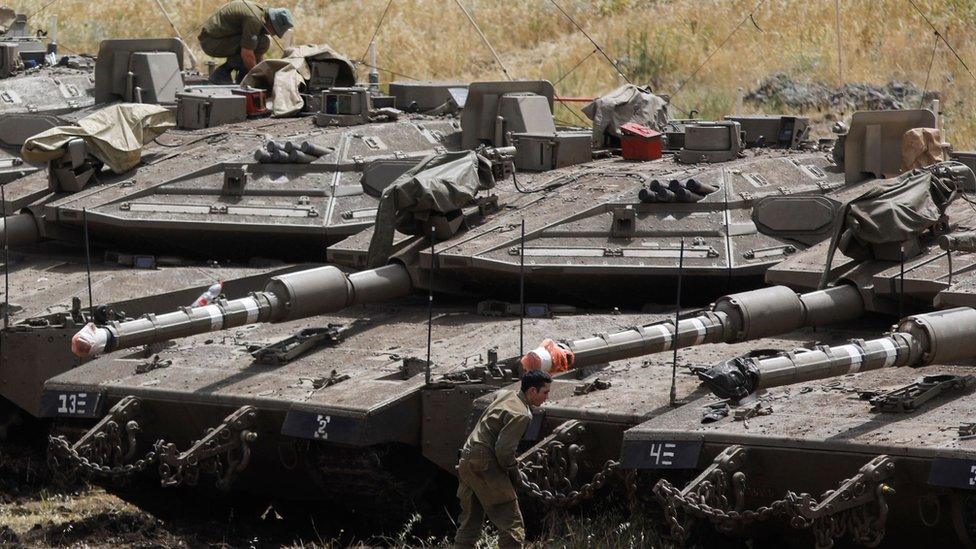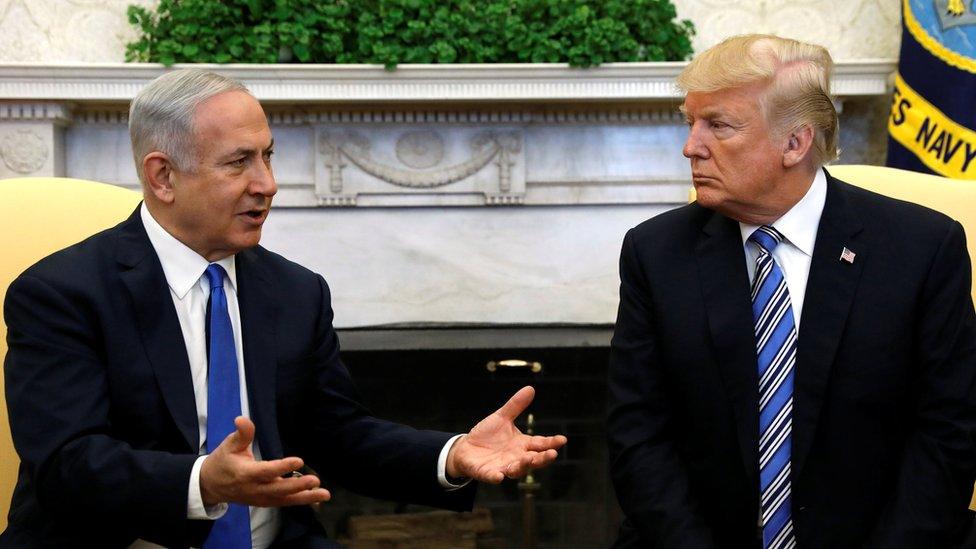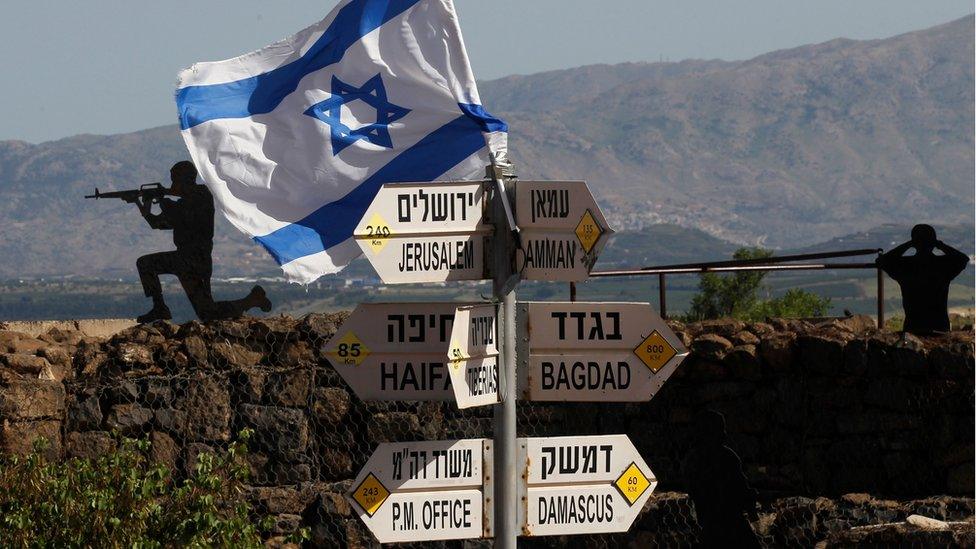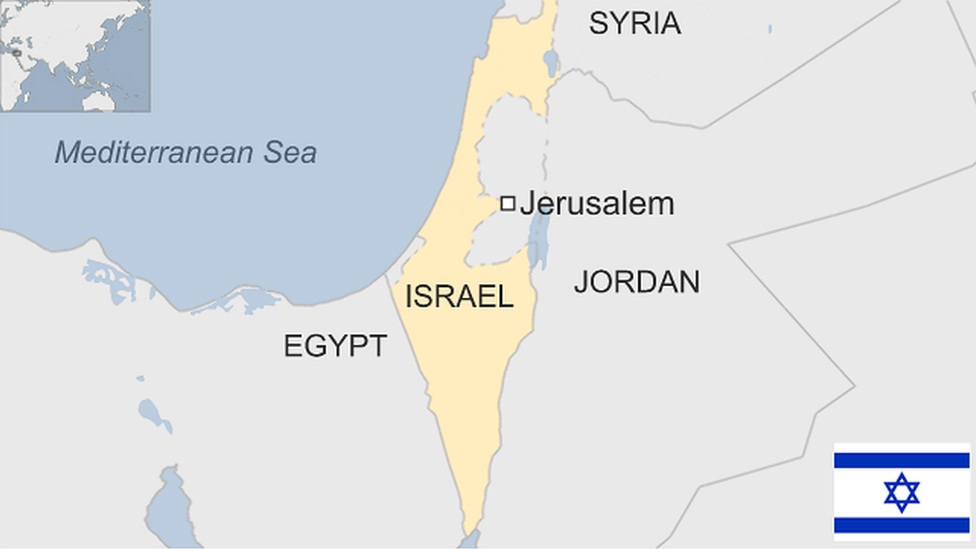Your questions answered on Iran and Israel relations
- Published

Tensions continue to rise in the Middle East, after Israel launched missile attacks on Iranian targets in Syria, in response to rockets fired at its positions in the occupied Golan Heights on Wednesday night.
There has been international condemnation of the rocket-firing, which Israel blamed on Iran, with the United States accusing Iran of trying to provoke a wider Middle East conflict.
So what could happen next in the region, and why are the countries in conflict? The BBC's defence and diplomatic correspondent Jonathan Marcus has answered some of your questions:
Why is there conflict between Israel and Iran?
There is little doubting Iran's fundamental antipathy towards Israel or its desire for the removal of the Jewish State. It has long supported radical groups opposed to Israel but now, because of its involvement in the war in Syria, it finds itself potentially on Israel's northern border.
Syrian President Assad's victory is now Iran's regional opportunity.
Iran's regional influence is growing. It is eager to establish itself as a military player in Syria. This - separately from its nuclear programme - is something that Israel sees as a fundamental threat.
Syrian state TV footage shows Israeli missiles over Damascus
Will Israel strike Tehran if Iran gets closer to developing weapons of mass destruction?
The nuclear dimension is now rearing its head again. Remember before the nuclear agreement with Iran - the Joint Comprehensive Plan of Action, JCPOA - that Mr Trump just abandoned, Israel and Iran were potentially heading for conflict, with fears that Israel (and/or the US) would strike at Iran's nuclear facilities.
What is the international community doing to prevent an escalation?
While everyone is worried and urging caution, outside actors can only impact events in a limited fashion. Israel and Iran are on a strategic collision course. Russia - also a player in Syria - has largely turned a blind eye to Israel's use of Syrian air space. It does not see its own and Iran's regional interests as necessarily intertwined.

Israeli PM Benjamin Netanyahu and US President Donald Trump met in Washington in March 2018
The US has a diminishing diplomatic influence in the region and President Trump is likely to be a strong advocate of Israel's muscular stance.
Is Israel doing all the provoking?
I don't know. It is certainly sending a very strong message to Tehran to think again. Iran sees Israel's actions in Syria as provocative. Israel is opposed to Iran's growing military role on its border.
Who would the UK - not the UN or Nato - back in a conflict between Israel and Iran?
I'm not sure about active "backing". Britain is certainly unhappy about Iran's wider regional role and concerned about its nuclear ambitions. Unlike the US, it wants to stick with the nuclear deal. I think all major governments and international institutions will want to avoid a major regional conflagration between Israel and Iran.
In the UK's first formal response, external to Wednesday night's attacks, Foreign Secretary Boris Johnson said: "The United Kingdom condemns in the strongest terms the Iranian rocket attacks against Israeli forces. We strongly support Israel's right to defend itself."
And he urged Iran to "refrain from further actions which will only lead to increased instability in the region."
Allow X content?
This article contains content provided by X. We ask for your permission before anything is loaded, as they may be using cookies and other technologies. You may want to read X’s cookie policy, external and privacy policy, external before accepting. To view this content choose ‘accept and continue’.
What event on either side would characterise an "escalation"? Is there a defined red line for Israel and Iran, and if so, where?
Israel's red lines up to now have been related to the transfer of advanced weaponry by Iran to Hezbollah in Lebanon. It has attacked arms convoys and weapons dumps. It is concerned about more accurate long-range missiles, sophisticated anti-ship and anti-armour weapons reaching the Shia militia.
Now, though, things have moved on - Iranian forces are now establishing themselves in Syria - and by the scale and scope of its strikes on Wednesday night, Israel is saying that enough is enough. Effectively, these Iranian forces are a long way from home and should go back to Tehran!
Israeli military spokesmen insist that all the 70 or so targets they hit on Wednesday night were core Iranian Revolutionary Guard installations - not pro-Iran militias or proxy forces.
Are there talks between Israel and Iran on any level?
I would be surprised if there were any direct contacts at all. Others may act as intermediaries - Russia for example - but the "message" from Israel to Iran has clearly been delivered in a more direct way.
In the days of the Shah, Israel was a close ally of Iran. Relations were broken off after the Islamic Revolution in 1979, though it is thought that for a period Israel continued to supply arms to Iran which was then waging a bitter struggle with Iraq. Ultimately, relations went into the freezer.
Iranian rhetoric and policy is strongly anti-Israel. Iran has given strong military support, not only to its Shia allies like Hezbollah in Lebanon, but is widely thought to have helped sponsor terrorism against Israeli or Jewish targets abroad - something of course that Iran has always denied.

Produced by Sherie Ryder, UGC and Social News team
- Published10 May 2018

- Published14 October 2024

- Published13 October 2023
